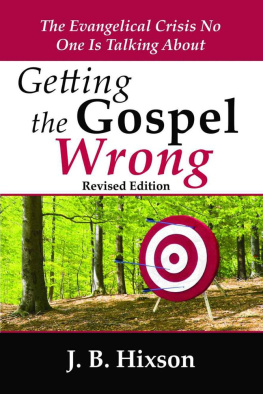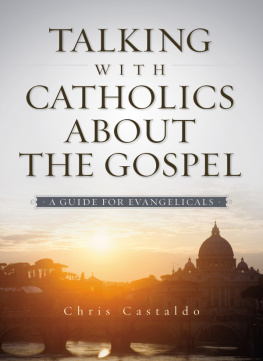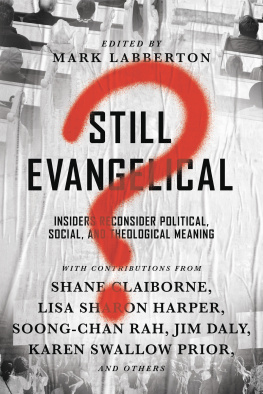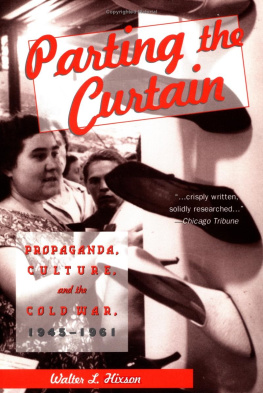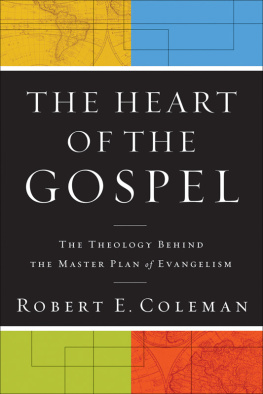J. B. Hixson - Getting the Gospel Wrong: The Evangelical Crisis No One Is Talking About
Here you can read online J. B. Hixson - Getting the Gospel Wrong: The Evangelical Crisis No One Is Talking About full text of the book (entire story) in english for free. Download pdf and epub, get meaning, cover and reviews about this ebook. year: 0, genre: Religion. Description of the work, (preface) as well as reviews are available. Best literature library LitArk.com created for fans of good reading and offers a wide selection of genres:
Romance novel
Science fiction
Adventure
Detective
Science
History
Home and family
Prose
Art
Politics
Computer
Non-fiction
Religion
Business
Children
Humor
Choose a favorite category and find really read worthwhile books. Enjoy immersion in the world of imagination, feel the emotions of the characters or learn something new for yourself, make an fascinating discovery.
- Book:Getting the Gospel Wrong: The Evangelical Crisis No One Is Talking About
- Author:
- Genre:
- Year:0
- Rating:3 / 5
- Favourites:Add to favourites
- Your mark:
- 60
- 1
- 2
- 3
- 4
- 5
Getting the Gospel Wrong: The Evangelical Crisis No One Is Talking About: summary, description and annotation
We offer to read an annotation, description, summary or preface (depends on what the author of the book "Getting the Gospel Wrong: The Evangelical Crisis No One Is Talking About" wrote himself). If you haven't found the necessary information about the book — write in the comments, we will try to find it.
J. B. Hixson: author's other books
Who wrote Getting the Gospel Wrong: The Evangelical Crisis No One Is Talking About? Find out the surname, the name of the author of the book and a list of all author's works by series.
Getting the Gospel Wrong: The Evangelical Crisis No One Is Talking About — read online for free the complete book (whole text) full work
Below is the text of the book, divided by pages. System saving the place of the last page read, allows you to conveniently read the book "Getting the Gospel Wrong: The Evangelical Crisis No One Is Talking About" online for free, without having to search again every time where you left off. Put a bookmark, and you can go to the page where you finished reading at any time.
Font size:
Interval:
Bookmark:
Contents
Getting the Gospel Wrong
The Evangelical Crisis No One Is Talking About
Revised Edition
J. B. Hixson
Grace Gospel Press
Duluth, Minnesota
2013 J. B. Hixson
All rights reserved. No portion of this publication may be reproduced, stored in a retrieval system, or transmitted in any form or by any means, electronic, mechanical, photocopy, recording, scanning, or otherwise, except as provided for by USA copyright law, without the prior written permission of the publisher.
All Scripture quotations, unless otherwise indicated, are taken from the
New King James Version. Copyright 1982 by Thomas Nelson, Inc.
Used by permission. All rights reserved.
ISBN-13: 978-0-9799637-9-7
ISBN-10: 0-9799637-9-6
Library of Congress Control Number: 2013933325
Grace Gospel Press
201 W. Saint Andrews St.
Duluth, MN 55803
U.S.A.
(218) 724-5914 ext. 208
www.gracegospelpress.com
DEDICATION
To Wendy
There are many virtuous and capable women
in the world, but you surpass them all!
(Proverbs 31:29)
For I am not ashamed of the gospel of Christ,
for it is the power of God to salvation
for everyone who believes,
for the Jew first and also for the Greek.
Romans 1:16 (NKJV)
ACKNOWLEDGMENTS
Getting the Gospel Wrong represents the culmination of nearly twenty years of reflection on the topic of evangelical soteriology (the doctrine of salvation). Of course, since systematic theology is a life-long process, not a product, refinement and reflection are ongoing as I study the Word of God and continually synthesize theological truths from Scripturethe only standard for our beliefs, attitudes, and practices. Nevertheless, the present work reflects a comprehensive overview of the biblical doctrine of salvation from a conservative, evangelical perspective, as well as a critique of the various soteriological methods prevalent within postmodern American evangelicalism. Along the way many people have influenced my thinking as I interacted with biblical and theological scholarship on this issue.
First, I wish to acknowledge my immediate and extended families who made significant sacrifices during my academic pursuits at Houston Baptist University, Dallas Theological Seminary and Baptist Bible Seminary. I am grateful for the strong, biblical heritage that my mom and dad provided during my formative years and for their faithful, unconditional support of my ministry to this day. I am equally grateful for my godly wife, Wendy, who never has failed to support whatever ministry endeavors we have pursued together, even when the personal cost was quite high; and has affirmed my passion for the purity of the gospel at every turn. My children have made sacrifices they may not even be aware of as I was away from home four to six weeks a year for several years during my Ph.D. studies. And when I was home, the seemingly endless hours of study and writing often kept me from spending time with my wife and children to the degree that I wish I could have. My prayer is that the positive contribution to the body of Christ that is provided by Getting the Gospel Wrong will offset any negative effects of the sacrifices made by Wendy and the children.
In addition to my family, I wish to thank the following people for the part they played, whether wittingly or unwittingly, in the development of this book: the members of the churches I have pastored: Community Bible Church in Van Alstyne, TX; Tremont Baptist Church in Tremont, IL; Keeler Baptist Church in Borger, TX; Anchor Bible Church in Cypress, TX; my friends and colleagues at various other ministries where I have served: The College of Biblical Studies, Fairfield Baptist Church, Grace School of Theology, Free Grace Seminary, Free Grace Alliance, Logos Bible Software; my dissertation readers at Baptist Bible Seminary: Dr. Ken Gardoski, Dr. Mike Stallard, and Dr. Robert Lightner. I am especially grateful for Dr. Mike Stallards profound influence on the development of my theological method. Dr. Stallard helped me to see the importance of being consistent in the synthesis of my hermeneutics, exegesis and systematic theology. A special thank you also is owed to Dr. Ken Gardoski for his patience, grace, and editing expertise as he helped me produce the final draft of my dissertation.
It would be difficult to recall and list all of the many other individuals who have helped to shape my thinking through the years on the topic of the purity and accuracy of the gospel. God places people in our lives whose influence often is unrecognized this side of Glory. Thank you to all of my close friends, colleagues, professors, mentors, and acquaintances for the sharpening role you have played in my life and ministry.
PREFACE TO THE REVISED EDITION
It was November of 2007, and I found myself in San Diego, California to attend the annual meeting of the Evangelical Theological Society. I remember the day well, because I was delighted by the mild weather as I drove to a popular hamburger place to meet with a young man who had contacted me via my web site. Ill call him Arthur.
Arthur was not a pastor, nor an academician. He was not a scholar, nor a ministry leader. He was simply a passionate young man who loved to talk and blog about theology. Frankly, I was looking forward to some great theological repartee.
At the time, I was leading a non-profit ministry called the Free Grace Alliance (FGA), and Arthur asked for a meeting in order to discuss certain areas of disagreement that he had with me and others within the FGA. Arthur had been influenced by a false teaching that emanated from an organization called the Grace Evangelical Society and was beginning to gain traction within the so-called Free Grace movement. As we sat down to eat, the conversation quickly turned to the gospel.
Arthurs position was clear: belief in the death and resurrection of Christ is unnecessary to have eternal life. In fact, according to Arthur, one need not believe anything specific about Jesus at allwho He is or what He has done for our sinsnothing at all, other than the simple fact that He guarantees eternal life to anyone who believes in Him.
As we talked, it became clear that Arthur was not interested in hearing my arguments as to why the atoning work of Christ on the cross is central to the gospel message. In fact, he grew agitated with me when I persisted in talking about the cross.
It was clear to me at the time, and became even clearer over the months that followed, that Arthur was blindly allegiant to those who had persuaded him with this false doctrine. To those in Arthurs camp, the death and resurrection of Christ are optional truths when it comes to the saving gospel message.
As I continued to drill down on Arthurs view and pressed him with various biblical and theological arguments, he made one particularly astounding statement. Keep in mind Arthurs premise: all you have to believe to be saved is that Jesus guarantees eternal life. Anything beyond that is optional and unnecessary. To that end, Arthur declared that an unsaved person could be an avowed atheistdenying the very existence of Godand then come to believe that Jesus guarantees eternal life without ever acknowledging the existence of God, whereupon he would (in Arthurs view) receive eternal life. Then, according to Arthur, over the first few months or years of his Christian life, during the discipleship process, this person might (or might not) eventually come to believe that God exists!
I was dumbfounded listening to Arthurs arguments, just as you likely are reading this account. Imagine: an unsaved atheist can become born again while never acknowledging the existence of God! At that point, I ended any attempts to dissuade Arthur from his error. Sadly, it appeared to be a lost cause.
Next pageFont size:
Interval:
Bookmark:
Similar books «Getting the Gospel Wrong: The Evangelical Crisis No One Is Talking About»
Look at similar books to Getting the Gospel Wrong: The Evangelical Crisis No One Is Talking About. We have selected literature similar in name and meaning in the hope of providing readers with more options to find new, interesting, not yet read works.
Discussion, reviews of the book Getting the Gospel Wrong: The Evangelical Crisis No One Is Talking About and just readers' own opinions. Leave your comments, write what you think about the work, its meaning or the main characters. Specify what exactly you liked and what you didn't like, and why you think so.

